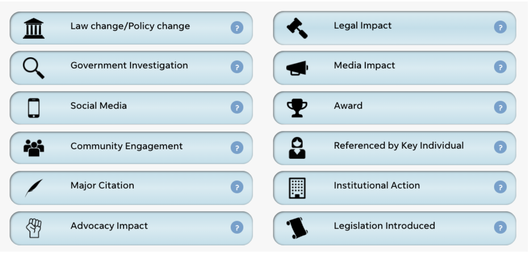|
By Anjanette Delgado Whether you’re making your case to subscribers or donors or just wanting to know what’s working, now is a good time to start tracking the impact of your journalism. Knowing your page views and monthly uniques is important, but so is being able to show that your investigative work inspired a change in the law or got the shady pol ousted. I’m seeing more and more newsrooms getting into subscription sales and making the case that #journalismmatters and requires investment. They’re not wrong, but I’ll argue it’s stronger communities that really matter and journalism is one way — albeit a necessary way — of getting us there. So let’s track that change and see if we can understand more about what the triggers are. Here are a few tips for getting started:  1. Agree on what types of impact matter to your organization. Real change, social likes? Think of the audience here. What will matter to donors, subscribers, your community? We define impact as “real-world change that happens as a result of our journalism,” and here’s what we track:
2. Set your bar and keep it there. Don’t fill up your list or database with small things that don’t matter. We don’t get caught up in Twitter retweets but do record when our journalism starts a valuable conversation on social media. Mongeau calls this “major social attention” and values when a key figure shares their work. 3. Talk to your staff about what you’re doing and why. Get buy in from key stakeholders. The investigative team is obvious, but others will see the benefit, too. Remember your editorial board, if you have one, because those folks actually advocate for change and need to know/show whether they’re effective. If Mongeau had just shared a finished list with staff and said “do this,” it wouldn’t have worked, she said. Without buy-in it becomes “just one more thing” we all have to do. Our selling point was that impact offers a balance to pure page view tracking and a more complete assessment of the i-team. If this work doesn’t make our communities better, what are we really doing here? I hear this at farewell parties for colleagues: Mission is what keeps journalists going despite worries about the industry’s future. 4. Get started however you can. The tool doesn’t matter as much as seeing progress, but a good tool makes it easier. We started with a Google Form that fed into a spreadsheet before deciding to invest in software dev; so did The Hechinger Report before switching to CIR’s open-source tracker. (We both knew forms wouldn’t work long-term because spreadsheets get unwieldy quickly, but they helped us refine our list of impacts to track.) Pedro Burgos’ Impacto project uses web scrapers to streamline the work (though that requires evidence of impact to be online, where it can be scraped). 5. Don’t let software stall your progress. Simple may be better for your developer, who probably has a bunch of other projects to get to, and it definitely is for the journalists using it. 6. Share your results with your readers, subscribers, members. Let them know why this matters, how they’ve helped (this is key) and how they can help going forward. How they can help might mean giving money, but it also could mean sharing story tips or calling their government representative. 7. Remember to share this information with marketing, sales and memberships, too. They’re trying to make an effective case for investing in the type of work that makes people’s lives better. At The Hechinger Report, Mongeau said she’s found impact effectively motivates both donors and members to give. Regardless of our business models, we all could use a bit more of that motivation. Here's some stories from the trenches and their impact:
If you have an impact story to share, email [email protected]. Anjanette Delgado is the senior news director for digital at the Detroit Free Press and freep.com, part of the USA Today Network. Twitter: @anjdelgado. ### Comments are closed.
|
AuthorWrite something about yourself. No need to be fancy, just an overview. Archives
December 2023
Categories
All
|

 RSS Feed
RSS Feed